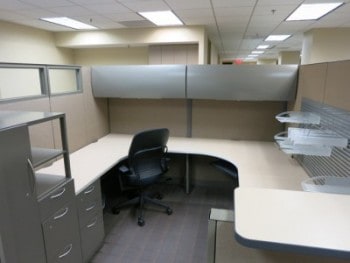3 Reasons Why A Grand Central Shared Law Office Space is a Great Choice for Solo Attorneys
What is shared law office space?
Shared law office space is a fully equipped and move-in ready office environment that provides solo attorneys and small law firms a real estate option other than working from their home or signing a direct to landlord lease.
What is a workstation?
A workstation, sometimes referred to as a “cubicle” is a semi-private office space located within a shared law office. Depending on the executive office provider, a workstation can range in size from 25 square feet to 64 square feet. Generally, they come fully furnished with a desk and office chair.
What benefits does renting a workstation provide a solo attorney?
1. Affordability.

Workstations are extremely popular with new solo attorneys because they offer much less overhead than a traditional office rental.
This is important because of the uncertainty associated with starting a new law practice, especially about where to get clients to actually pay the office rent. Some executive office providers even offer a gradual rent increase over the contract term to minimize the amount of office rent a new attorney is responsible for during the critical first few months of solo practice.
2. Collaboration.

For example, in a B-to-C practice such as immigration, attorneys often have practice area questions that arise involving other consumer based areas of the law, such as family law, criminal defense and employment. Immigration attorneys often have immigration based questions, as the practice is extremely specialized.
In shared office space, the immigration attorney can ask colleagues to sit-in on meetings or co-counsel on practice areas they are unfamiliar with. Shared office space aids in providing more competent client representation and gives the illusion that the immigration attorney is much larger than a one-man army.
3. Referral Possibilities.

In effect, lawyers who choose a shared office space transform their monthly rent from a fixed expense to a potential profit center. This adds significant economic value to the firm’s bottom line.
The most important part of sharing office space with other attorneys is finding the practice area mix. For example, while a personal injury attorney can certainly co-exist with a bunch of tax or patent lawyers, the better fit from a business development perspective would be a suite with immigration, workers’ comp and matrimonial attorneys.
If a shared office space only has a limited number of offices, an attorney would want to make sure the some of the other attorneys practice in complementary areas of the law that will have the most potential for referral exchange. Being selective about practice niches is less of a concern in larger shared law office suite with many attorneys from diverse practice areas. For example, in a shared office space like Law Firm Suites, where over 125 attorneys in different practice areas share space, there will always be an opportunity to build a referral connection.


